|
|
|
Sort Order |
|
|
|
Items / Page
|
|
|
|
|
|
|
| Srl | Item |
| 1 |
ID:
189981


|
|
|
|
|
| Summary/Abstract |
After more than 25 years of scholarship, the deliberative turn in international relations (IR) theory is ready to be revisited with a fresh perspective. Using new methods from automated text analyses, this explorative article investigates how rhetoric may bind action. It does so by building upon Schimmelfennig’s original account of rhetorical entrapment. To begin, I theorize the opposite of entrapment, which I call rhetorical hollowing. Rhetorical hollowing describes a situation in which actors use normative rhetoric, but instead of advancing their interests, such rhetoric fails to increase their chances of obtaining the desired outcome because the normative force of their rhetoric has eroded over time. To provide plausibility to both entrapment and hollowing, I present two mechanisms by which language is connected with action in the United Nations Security Council. Finally, I run a series of time-series-cross-section models on selected dictionary terms conducive to entrapment or hollowing on all speeches and an original Security Council resolution corpus from 1995 to 2017. The research shows that while mentioning ‘human rights’ is consistently associated with increased odds of authorization of force; the word ‘terrorism’ is associated with a decrease of odds for intervention. This finding suggests that some terms may not only entrap or hollow but also normatively backfire.
|
|
|
|
|
|
|
|
|
|
|
|
|
|
|
|
| 2 |
ID:
189992
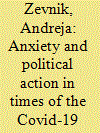

|
|
|
|
|
| Summary/Abstract |
Since the beginning of the global Covid-19 pandemic in the spring of 2020 countries across the world have implemented various measures to contain the virus. They have restricted public gatherings, mobility and congregation of people at homes and in public places. These restrictions however did not stop another chain of events – the global Black Lives Matter (BLM) protests. In the summer of 2020 people across the globe mobilised to protest the police killing of George Floyd. In the UK the protest for Black Lives took place in all major cities, but they also continued weekly in smaller communities by ‘taking the knee’. What interests me in this contribution is how anxieties experienced during the global pandemic contributed to the mobilisation of large-scale political actions for racial justice and how might we consider anxiety as a mobilising force in political space in times of global pandemic in particular in the context of anti-racist protests such as BLM. This forum contribution opens by considering how global pandemic aided conditions for political action for racial justice, before discussing the role of anxiety in political mobilising. Here I first detailed how anxiety is understood in Lacanian psychoanalysis before considering what it tells us about the BLM protests for racial justice and specifically the removal of the Colston statue during the Bristol protest on June 7 2020.
|
|
|
|
|
|
|
|
|
|
|
|
|
|
|
|
| 3 |
ID:
189989
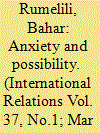

|
|
|
|
|
| Summary/Abstract |
This is the introduction to the forum, Anxiety and possibility: the many future(s) of COVID-19. It summarizes the contributions within a common framework and situates them in the extant literature.
|
|
|
|
|
|
|
|
|
|
|
|
|
|
|
|
| 4 |
ID:
189993
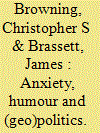

|
|
|
|
|
| Summary/Abstract |
Humour is usually overlooked in analyses of international politics, this despite its growing prevalence and circulation in an increasingly mediatised world, with this neglect also evident in the growing literature on ontological security and anxiety in IR. Humour, though, needs to be taken seriously, crossing as it does the high-low politics divide and performing a variety of functions. In the context of the Covid pandemic we argue that the link between humour and anxiety has been evident in three notable respects: (i) functioning as a (sometimes problematic) form of stress relief at the level of everyday practices of anxiety management, (ii) working to reaffirm biographical narratives of (national) community and status and (iii) most significantly for IR, as a form of anxiety geopolitics.
|
|
|
|
|
|
|
|
|
|
|
|
|
|
|
|
| 5 |
ID:
189990
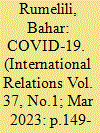

|
|
|
|
|
| Summary/Abstract |
This contribution to the Forum, Anxiety and possibility: the many future(s) of COVID-19, develops a conception of uncertainty as constituted by cognitive (awareness of possibilities) and affective (mood in which possibility is encountered) dimensions. Based on this conception, it is suggested that the COVID-19 crisis has led to a qualitative leap in our already growing sense of uncertainty, both accentuating our awareness of possibilities that are unforeseen, and rendering us attuned to the world in anxiety rather than fear.
|
|
|
|
|
|
|
|
|
|
|
|
|
|
|
|
| 6 |
ID:
189991
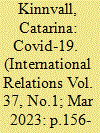

|
|
|
|
|
| Summary/Abstract |
This short article discusses how different fantasy narratives have come together during the Covid-19 crisis in various far-right movements, parties and audiences across the world and how much of these fantasies rely on racialised and gendered notions of a fantastical world-order in which particular forms of emotional governance provide a relief and sense of security to certain societal groups. This involves a close engagement with crisis and crisis narratives in relation to ontological insecurity and anxiety; how such crisis narratives have materialised in fantasies related to borders and corona nationalism, and the emotional governance of these particular fantasies in the hands of populist leaders and their increasingly receptive audiences.
|
|
|
|
|
|
|
|
|
|
|
|
|
|
|
|
| 7 |
ID:
189985
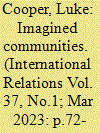

|
|
|
|
|
| Summary/Abstract |
Drawing on the concept of uneven and combined development this article critically interrogates Benedict Anderson’s theory of the ‘imagined community’ through an historical investigation into the English-realm-cum-British-empire. Placing its rise in the context of the conflicts of Post-Reformation Europe, it identifies vectors of combined development (money, goods, ideas, people) which shaped the formation of new imagined communities. These post-Reformation struggles were not defined by nationality but subjecthood, which saw ‘the realm’ displace the monarch as an object of rights and duties. The 18th century rise of British nationalism was a response to the long crisis of subjecthood (1639–1688). However, this emergence was uneven and non-linear, such that it co-existed as a political imagination with continued belief in – and political support for – subjecthood. Ironically, given its latter-day mythology, the American Revolutionary War was fought to protect subjecthood under the Crown from subordination to the British nation and its parliament.
|
|
|
|
|
|
|
|
|
|
|
|
|
|
|
|
| 8 |
ID:
189982
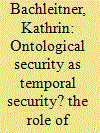

|
|
|
|
|
| Summary/Abstract |
This article explores the link between collective memory and state behaviour in international relations. In that regard, it develops a new concept entitled ‘temporal security’. Building on the existing ontological security literature, it extends a temporal understanding to its underlying identity concept. Countries are now assumed to be temporal-security seekers vis-a-vis a ‘significant historical other’ from their past. Decision makers thus enter into a self-reflective conversation with their country’s ‘collective memory’ when choosing courses of action. Contrasted with existing physical-security and ontological security explanations for state behaviour, the explanatory potential of the temporal-security approach is in a second step illustrated by the empirical case of West Germany and Austria, two former Nazi perpetrator states, and their respective assignments of support during conflict in the Middle East. Through a comparative, qualitative discourse analysis of historical documents during the Six-Day War of 1967 and the Yom Kippur War and oil crisis of 1973, the empirical study finds that West Germany and Austria adopted different courses of action in their international politics, because they looked to Nazi Germany as their significant historical other.
|
|
|
|
|
|
|
|
|
|
|
|
|
|
|
|
| 9 |
ID:
189987
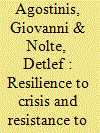

|
|
|
|
|
| Summary/Abstract |
Latin American regionalism displays a long history of crises, which have affected almost all regional organisations (ROs) across different waves of regionalism. The article conducts the first comparative analysis of the outcomes of crises in Latin American ROs across time, tackling the following questions: What have been the outcomes of the crises faced by Latin American ROs? Under what conditions does a crisis result in the survival or breakdown of the affected RO in Latin America? We adopt a multi-method approach that combines QCA with process tracing to identify the causal pathways to the survival or breakdown of ROs across a universe of eight crises. The findings show that Latin American ROs have been resilient to crises, which resulted in RO survival in seven cases out of eight. The QCA reveals how the distributive nature of interstate conflicts and the availability of majority voting are both sufficient conditions for Latin American ROs to survive a crisis. Analysis of the outlier case of UNASUR shows that normative conflicts that take place in the absence of majority voting constitute a ‘perfect storm’ configuration that can lead to RO breakdown. The findings also show that Latin America ROs’ tendency to survive crises is associated with the preservation of the status quo in terms of institutional design, which in some cases is achieved through the temporary flexibilisation of existing rules. Differently from the case of the EU, then, the crises of Latin American ROs have not led to the deepening of regional integration, but rather to institutional inertia.
|
|
|
|
|
|
|
|
|
|
|
|
|
|
|
|
| 10 |
ID:
189986


|
|
|
|
|
| Summary/Abstract |
In recent years, scholars have devoted increased attention to the notion of roles in foreign policy analysis and international relations. However, role theory literature has so far less frequently explored re-conceptualising role conflict. To further understand the concept of role conflict, this article aims to unpacks the notion of international audiences. To do so, this article advances the application of role conflict by arguing the importance of notion of vertical role conflict that considers the different levels of international audiences, specifically regionally and globally. Building upon the symbolic interactionist conceptualisation of social interaction as a stage, regional and global levels can be seen as arenas for role-playing but with different expectations to fulfil. The article proposes two types of vertical role conflict, stemming from the difference between the regional and global levels. These theoretical claims will be elucidated through the study of Indonesia’s regional and global engagement in two areas: human rights and trade.
|
|
|
|
|
|
|
|
|
|
|
|
|
|
|
|
| 11 |
ID:
189984


|
|
|
|
|
| Summary/Abstract |
This article explores the relationship between the 19th century ‘global transformation’ and the contemporary intensification of communication media through the lens of Greater Britain, a late-Victorian ordering imaginary centred on the integration of Britain and its white settler colonies. Contrary to existing conceptions of globe-spanning media as either components of ‘interaction capacity’ or boundary conditions that set broad outer limits for political thought, I advance an understanding of media as socio-technical and political structures in their own right and explore how they surface meanings and representations upon which imaginaries such as Greater Britain depended. The argument thereby contributes to International Relations (IR) debates on global modernity, communication media and the dynamics of historical change.
|
|
|
|
|
|
|
|
|
|
|
|
|
|
|
|
|
|
|
|
|